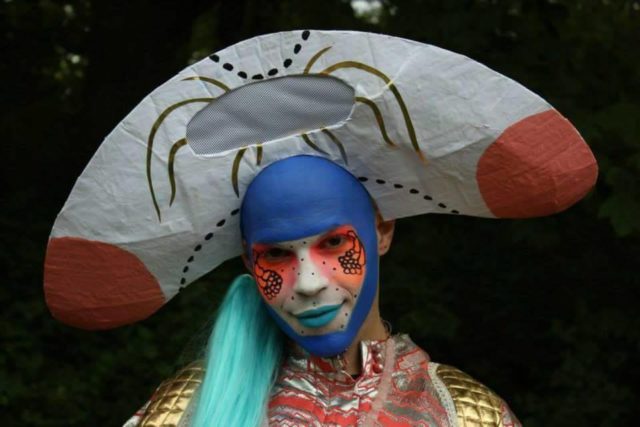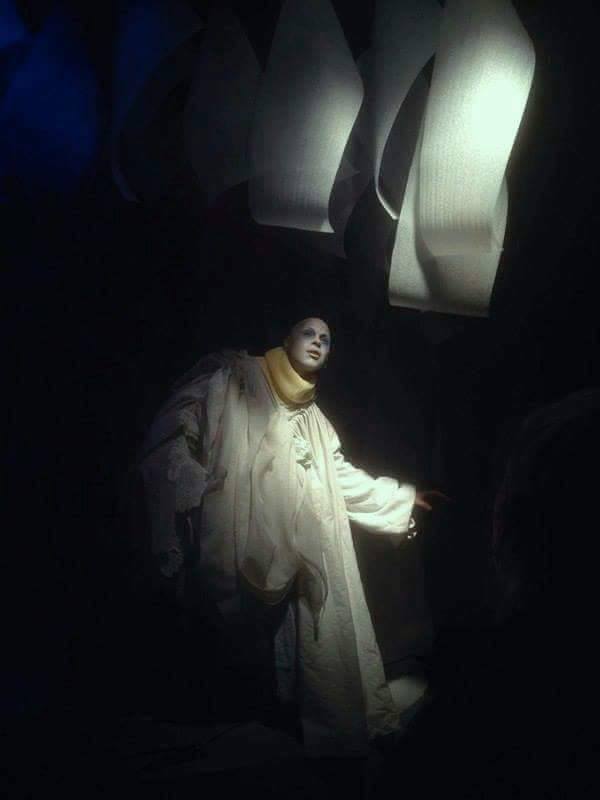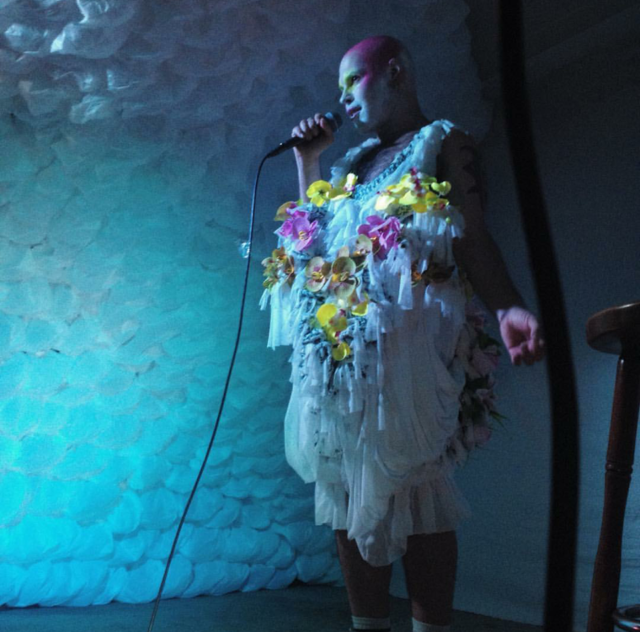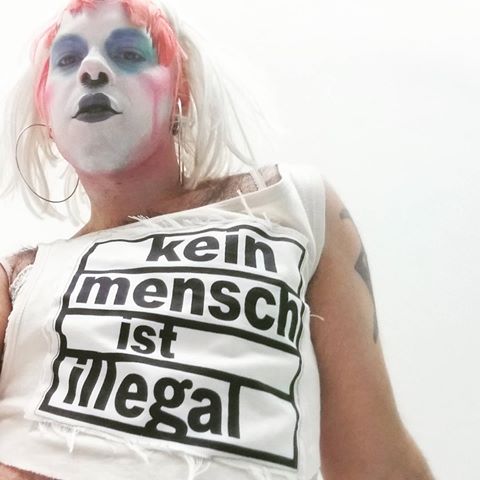
Dusty Whistles
It amazes me that we still talk about drag as if it is anything but performance art. Yes, there are degrees of drag, which makes it hard to pin down, to make institutional, and there are many, many styles: night club fancy drag, high end theatre grade drag, quick-draw men in dresses/women in suits “rough drag”, and the still alive tradition of “female/male impersonation”, to list only a few.
We understand the performative nature of gender itself, and from that how our daily gender performances can so easily become creators of further performances. The very term drag is in many ways just another descriptor of life itself (“it’s all drag”, as RuPaul famously remarked of so-called gender normative presentation). Why then do we still regulate drag to “entertainment” and not discuss it with the same bookish, hushed, churchy-schooly gaze we apply to more official, more self-declaring forms of performance art? Is it simply because drag shows mostly happen in bars and performance art generally happens in art galleries? Is it simply a class thing? Well, fuck that.
Berlin-based, NYC-born artist Dusty Whistles practices a purpose-driven drag that blends futuristic post-gender, post-human iterations with front line political messaging. In Berlin, where mainstream drag can be boiled down to two show types, Cabaret/Sally Bowles re-castings and Hausfraus in bad wigs low comedy, Whistles is part of a new drag generation that wants to put the pocket knife back in the queen’s purse. Drag is political, and always has been. Sometimes, however, drag culture needs a bit of a tune up. Whistles is here to help.
In a series of monthly events, Whistles and their colleagues take the non-essentialist truth, that gender is a fluid construct, to the front lines of Europe’s current identity crisis. How, Whistles asks, can the innate in-betweeness of drag be a lived example in the promotion of understanding between “born” Europeans and “arrived” Europeans; in particular to the increasingly difficult situations lived by displaced and migrating people who come to Europe seeking asylum?
The connection is so clear – people who live between binary-based gender assumptions and people who live between nationalist identities and those sets of assumptions have a lot in common. To be always both and neither in a world that demands singularity is damned exhausting. Watching Whistles in action, one marvels at the sweet truth of the parallels they present, dissect, and make beautiful.

Dusty Whistles
Dusty Whistles: I’m the child of immigrants in North America; my parents arrived from Venezuela and the island of Madeira to a suburb of New York City, cycling distance to the 7 train in Flushing Queens. My parents gave a shot at a more typical North American lifestyle, and we lived in a nuclear family constellation, that is, till the apartment building which I spent my early childhood in was condemned. In solidarity with an old neighbor my folks refused to move as our building became slowly empty. Memories of my early childhood were composed of running around stairwells and empty flats of a crumbling building, and my father taking down a wall to give our small flat an open floor plan feeling, even though we, my parents, brother sister and I, still all slept in one room. Later we moved in together with 3 generations of my family, in the same town, surrounded by the parking lot for the LIRR train. I feel like these experiences of urban decay and reinvention, as well as collectivism, made for an easy transition into my life in the squats of the LES and in the collective houses of the DIY Punk scene of Brooklyn.
New York City at the time in which I grew up was still full of experimentation and a rich culture of poor people, very much unlike it is today. I started my relationship with the city, being young, out, and gay, and sneaking out of my family’s home in the night to partake in the vibrant club culture of the late 90’s, where difference and wit were celebrated above all. I saw the city I love change into a safe homogenized corporatized and heavily policed playground for the wealthy. Sometime shortly after the increased police powers granted in the wake of September 11th and the Patriot Acts 1 and 2, and the brutality of mass arrests during the Republican National Convention for Bush’s second term, I got the hell out.
RM Vaughan: What was it like to start over in a new country?
I had a limited connection to drag in Berlin, outside of an awareness and admiration of its history in the Polittunte movement, an intersection of drag and politics reaching back to drag’s history as a culture and artistic practice connected to resistance. Back in New York, drag was club kids, and piano bars, and the odd visit to Lucky Cheng’s with tourists.
[After much exploring] I found a community in [Berlin, with encouragement from the legendary drag artist/provocateur Olympia Bukkakis] in which I could interact with a political discourse that was not heavy with the weight of a lecture, a reading circle, a panel discussion, a workshop, or the dry and tired performance of a demonstration. I saw an art form that was interactive, vulnerable, ripe with the potential to experiment and play, and entrenched in a long history of resistance struggle.
It hasn’t stopped since then, contrary to my life and poverty, bouts of homelessness, and working two jobs as a carpenter and cleaner. And though I don’t confuse it for political action, I see it as an important part of my political practice, in the exercise of recreating a commons of sorts, exploring the possibility of collective emotional processing, and at times the fabulous simplicity of agitprop.

Dusty Whistles
Your work conflates the questions of gender identity, and of binaries, with the situation(s) of the dispossessed. To put it plainly, you embody in your performances the intersectionality between being multi-gendered and being multi-national. How did this parallel come to you and how do you continue to grow these representations in your work?
My drag persona is a living network of relation expressed through a point of multiple intersections of lifeforms and experiences. Sometimes I am a cloud and folds of atmosphere, sometimes the process of photosynthesis, or red volcanic earth and a field of orchids, sometimes more human in form but not in expression. It is somehow, also, an extension of what I would consider my spiritual life. Off the stage I am fluid in my gender presentation, often wearing wigs as prosthetics, and make up. The borders between my performance practice and my life are thin, and my life and its experience always bleeds through. The practice of performance is often for me a space to explore the struggles that I find myself and my community within, not to find answers to my questions, but to explore them in a space of play.
Do dispossessed, multi-national people (I hate the word “refugee”, aren’t we all refugees from something?) come to your performances? What do they say to you?
For starters, we are not all refugees. As a North American I come from a country that creates and feeds the massive global political instability and war that creates the conditions for people to need to flee their homes and lives, not by choice, but for survival. I am not subject to racial oppression and the violence of national borders and immigration policies. Yes, the nation in which I was born failed me, and the construct of nations fail all lifeforms, but there is an implicit privilege in holding certain markers of citizenship because of the currently insurmountable damage of empire and colonialism.
To answer the question, yes, I’m sure some refugees have seen my shows, especially since I participate in Queens Against Borders, a drag performance night which donates all its proceeds to support queer refugee projects and performers, who also participate in the night’s performances. But do they say anything particularly different compared to other audience members? No. My audiences are often queer, unless I’m in the context of a gallery or museum performance… but even then they are quite queer. I seem to do quite emotional performances, people often cry or open up to me afterwards. I guess I’m that emo-polemic queen. But those moments are quite beautiful, and I feel less alone, and the isolation of modern life falls to the wayside, even if just for a while. As always I feel more like a facilitator, or a channel, they are not my performances, we did it together. It is a sacrament of sorts.

Dusty Whistles
Why is it vital to be doing this work here, in Berlin, and now?
I am doing this work here because I live here. I am doing work about, and for the community I live in, particularly for those who are immigrants like me, but also to keep a culture alive that knows no country. It’s very internally focused work, I guess.
The sexual revolution of the west started here. It survived 2 wars, somehow. And the radical and playful culture of the squatters movement and the radical left laid more groundwork… institutions that somehow managed to survive… the few of them that are still left… and give this city its character. I wish I could be more positive about this city, positive that that energy will survive the meaning and culture-destroying mechanisms of late neoliberal capitalism, but I’m not so sure if it will. Cities are slowly becoming a way of life only for the wealthy and Berlin is no exception. I’m not wealthy, neither is my family, and I can envision a time in which I too will be forced to leave if I want to continue living an artful life.
There is a word in German, lebenskünstler (lebenskünstlerinnen in its gender neutral variation). It literally translates to “life artist” and is more often than not used as an insult for someone with a lack of direction. I take it on as a life direction, an archetype to embody, the fool in the tarot. It’s not the easiest of careers, and by no means the most profitable, but it depends on how you find value in your life.
Drag has always been political, always presented and at the same time messed with certainties and shared experience. Where do you see your work in the larger “canon” of drag (with full acknowledgement that drag defeats systems such as canonization … but everything comes from something, yah know?).
I struggle with this. I look at perfect make up, and the standardized and limited range of contemporary popular drag performance, and I do not see myself there. I enjoy it, for what it is, but it’s not something I can do well or find much satisfaction in. The German Polittunte scene, which also somehow still exists but is separate from the international “alternative drag” scene, doesn’t appeal to me in its current practice, and politics. I see myself take this art form into artistic institutions and also struggle as it bends and twists with more performance art narratives and an audience that doesn’t necessarily understand all of the subtlety that speaks to the queer community I would find in a bar or nightclub. Just the same in nightlife, I struggle to be heard reciting prose and lip syncing to Monteverdi arias over the clamor of “people wanting to have a good time”.
I’m still a young artist, and I guess I have yet to see where I fall into this “canon” or herstory. I know for certain I seek to preserve the connection of this art form to a herstory of resistance and revolt, to find overlaps in a political practice. Drag Queens in revolt at Stonewall, Drag Queens in the front lines of the Gay Liberation Front, Marsha P. Johnson, Sylvia Rivera, my New York City sisters, trans and fabulous, STAR (Street Transvestite Action Revolutionaries) and FEIRCE, and the queens of ACT UP, and the queens of Queer Fist and Gay Shame, the Radical Faeries and the Sisters of Perpetual Indulgence.
I seek to realize drag as a continued pursuit of an ideal that is never reached. An art of struggle, play, and failure, and an absolute rejection of things as they are for how they might be. Isn’t it fabulous?
Your work is giving and open, even, I would say, vulnerability-creating, or creating a safe space for vulnerability. Yet, we live in Germany, where vulnerability is almost a taboo. How do you reach a German audience in this climate, one that over-privileges the false face of “strength”?
Haha! I don’t think i do [reach them]… though there are often a lot of German people in my audiences, they are often Germans who feel comfortable in more multicultural/national communities. Still, i don’t really know how I do it, or if it is even something I can affect. It just is. Like I mentioned before the work moves through me and is realized by us together. I’m always so absolutely grateful for that opportunity. Without each other, we are nothing.


Comments on this entry are closed.